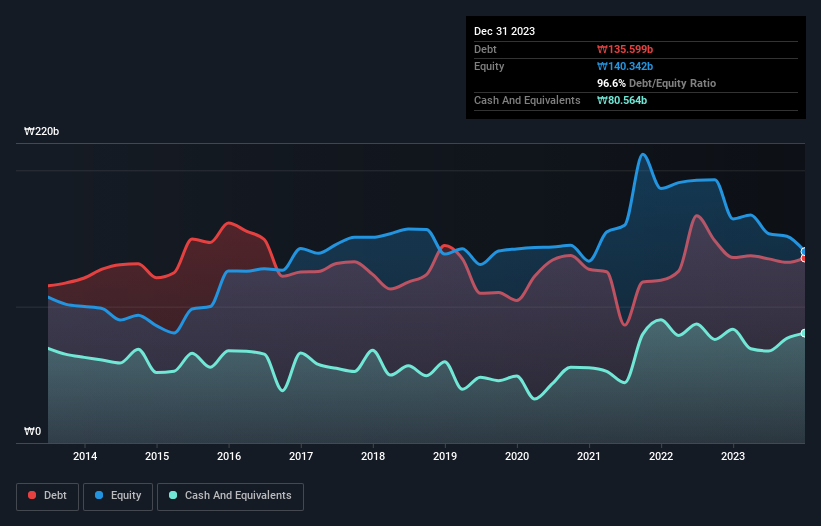- South Korea
- /
- Electronic Equipment and Components
- /
- KOSDAQ:A045970
Here's Why CoAsia (KOSDAQ:045970) Can Afford Some Debt
Legendary fund manager Li Lu (who Charlie Munger backed) once said, 'The biggest investment risk is not the volatility of prices, but whether you will suffer a permanent loss of capital.' So it seems the smart money knows that debt - which is usually involved in bankruptcies - is a very important factor, when you assess how risky a company is. We can see that CoAsia Corporation (KOSDAQ:045970) does use debt in its business. But the more important question is: how much risk is that debt creating?
When Is Debt A Problem?
Debt assists a business until the business has trouble paying it off, either with new capital or with free cash flow. Part and parcel of capitalism is the process of 'creative destruction' where failed businesses are mercilessly liquidated by their bankers. While that is not too common, we often do see indebted companies permanently diluting shareholders because lenders force them to raise capital at a distressed price. Of course, debt can be an important tool in businesses, particularly capital heavy businesses. The first thing to do when considering how much debt a business uses is to look at its cash and debt together.
Check out our latest analysis for CoAsia
What Is CoAsia's Debt?
The chart below, which you can click on for greater detail, shows that CoAsia had ₩135.6b in debt in December 2023; about the same as the year before. However, it does have ₩80.6b in cash offsetting this, leading to net debt of about ₩55.0b.

How Healthy Is CoAsia's Balance Sheet?
Zooming in on the latest balance sheet data, we can see that CoAsia had liabilities of ₩185.3b due within 12 months and liabilities of ₩29.3b due beyond that. Offsetting these obligations, it had cash of ₩80.6b as well as receivables valued at ₩22.0b due within 12 months. So its liabilities outweigh the sum of its cash and (near-term) receivables by ₩112.1b.
This is a mountain of leverage relative to its market capitalization of ₩176.3b. Should its lenders demand that it shore up the balance sheet, shareholders would likely face severe dilution. There's no doubt that we learn most about debt from the balance sheet. But you can't view debt in total isolation; since CoAsia will need earnings to service that debt. So if you're keen to discover more about its earnings, it might be worth checking out this graph of its long term earnings trend.
In the last year CoAsia had a loss before interest and tax, and actually shrunk its revenue by 18%, to ₩378b. We would much prefer see growth.
Caveat Emptor
While CoAsia's falling revenue is about as heartwarming as a wet blanket, arguably its earnings before interest and tax (EBIT) loss is even less appealing. Indeed, it lost a very considerable ₩25b at the EBIT level. Considering that alongside the liabilities mentioned above does not give us much confidence that company should be using so much debt. So we think its balance sheet is a little strained, though not beyond repair. However, it doesn't help that it burned through ₩8.8b of cash over the last year. So in short it's a really risky stock. There's no doubt that we learn most about debt from the balance sheet. However, not all investment risk resides within the balance sheet - far from it. To that end, you should learn about the 3 warning signs we've spotted with CoAsia (including 1 which doesn't sit too well with us) .
At the end of the day, it's often better to focus on companies that are free from net debt. You can access our special list of such companies (all with a track record of profit growth). It's free.
New: AI Stock Screener & Alerts
Our new AI Stock Screener scans the market every day to uncover opportunities.
• Dividend Powerhouses (3%+ Yield)
• Undervalued Small Caps with Insider Buying
• High growth Tech and AI Companies
Or build your own from over 50 metrics.
Have feedback on this article? Concerned about the content? Get in touch with us directly. Alternatively, email editorial-team (at) simplywallst.com.
This article by Simply Wall St is general in nature. We provide commentary based on historical data and analyst forecasts only using an unbiased methodology and our articles are not intended to be financial advice. It does not constitute a recommendation to buy or sell any stock, and does not take account of your objectives, or your financial situation. We aim to bring you long-term focused analysis driven by fundamental data. Note that our analysis may not factor in the latest price-sensitive company announcements or qualitative material. Simply Wall St has no position in any stocks mentioned.
About KOSDAQ:A045970
CoAsia
An investment holding company, provides system solutions in South Korea and internationally.
Flawless balance sheet and slightly overvalued.
Similar Companies
Market Insights
Community Narratives



